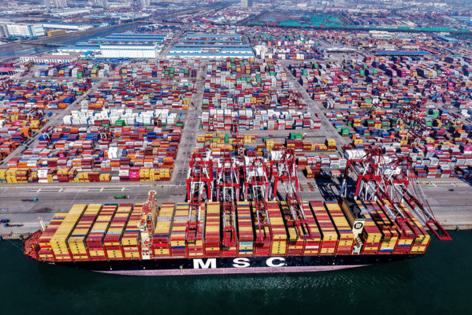Trump says he won't lower China tariffs to jump-start talks
Published in News & Features
WASHINGTON — President Donald Trump said he’s unwilling to preemptively lower tariffs on China in order to unlock more substantive negotiations with Beijing on trade.
“No,” Trump said Wednesday when asked by a reporter if he is open to pulling back his 145% duties on Chinese imports to get the world’s second-largest economy to the negotiating table.
The president’s comments come before Treasury Secretary Scott Bessent and U.S. Trade Representative Jamieson Greer meet this week in Switzerland with Chinese Vice Premier He Lifeng on trade. Trump spoke at a swearing-in ceremony for his ambassador to China, David Perdue.
Trump’s stance underlines the massive divide between the U.S. and China on trade and the difficult path they face to a possible agreement on lower tariff levels. It’s a dose of reality after Tuesday’s announcement of formal talks between the two sides generated optimism that the clash over import taxes could be resolved before it caused lasting economic damage.
The president denied the United States had initiated the trade talks with China, saying those claiming that the negotiations had come at Washington’s urging “ought to go back and study their files.”
China’s Commerce Ministry in a statement last week had said that senior U.S. officials had reached out to express their willingness to discuss tariffs.
“The U.S. has recently sent messages to China through relevant parties, hoping to start talks with China,” the ministry had said.
Trump on Wednesday also asserted that previously, the U.S. was “losing a trillion dollars a year” to China on trade and that “now we’re not losing anything” — an apparent reference to the trade deficit with Beijing.
Trump has said in recent days that he is willing to lower tariffs on China at some point, but has also insisted that U.S. consumers are willing to accept some higher prices and fewer choices to allow his bid to bring more manufacturing jobs to the country to succeed. Polls show most U.S. adults disapprove of Trump’s handling of tariffs and the economy.
The upcoming discussions mark the first confirmed trade talks between the U.S. and China since Trump announced his punishing levies.
China has retaliated against Trump’s trade moves with tariffs of 125% on American imports. The tit-for-tat actions have rattled markets and threatened to drive up prices for manufacturing equipment as well as affordable goods that many Americans rely on, including clothing and toys.
Bessent, in a Tuesday interview with Fox News, said current tariff rates aren’t sustainable and that talks will center on de-escalation rather than a big trade deal.
“We’ve got to de-escalate before we move forward,” Bessent said. “We don’t want to decouple, what we want is fair trade.”
Bessent acknowledged that Trump’s strategy can be unsettling for markets, but cast it as an advantage for the U.S. in negotiations. He said he and the president know what Trump would accept, but did not intend to openly share those details.
Both countries are facing pressure to reach a deal. The U.S. economy contracted at the start of the year for the first time since 2022 on a pre-tariffs import surge and more moderate consumer spending, In China, factory activity slipped into the worst contraction since Dec. 2023, the official manufacturing purchasing managers’ index showed.
Hours after confirming the talks with Bessent and Greer, Chinese President Xi Jinping’s government announced sweeping measures to stabilize markets and boost the country’s economy.
_____
(With assistance from Catherine Lucey.)
©2025 Bloomberg L.P. Visit bloomberg.com. Distributed by Tribune Content Agency, LLC.







Comments